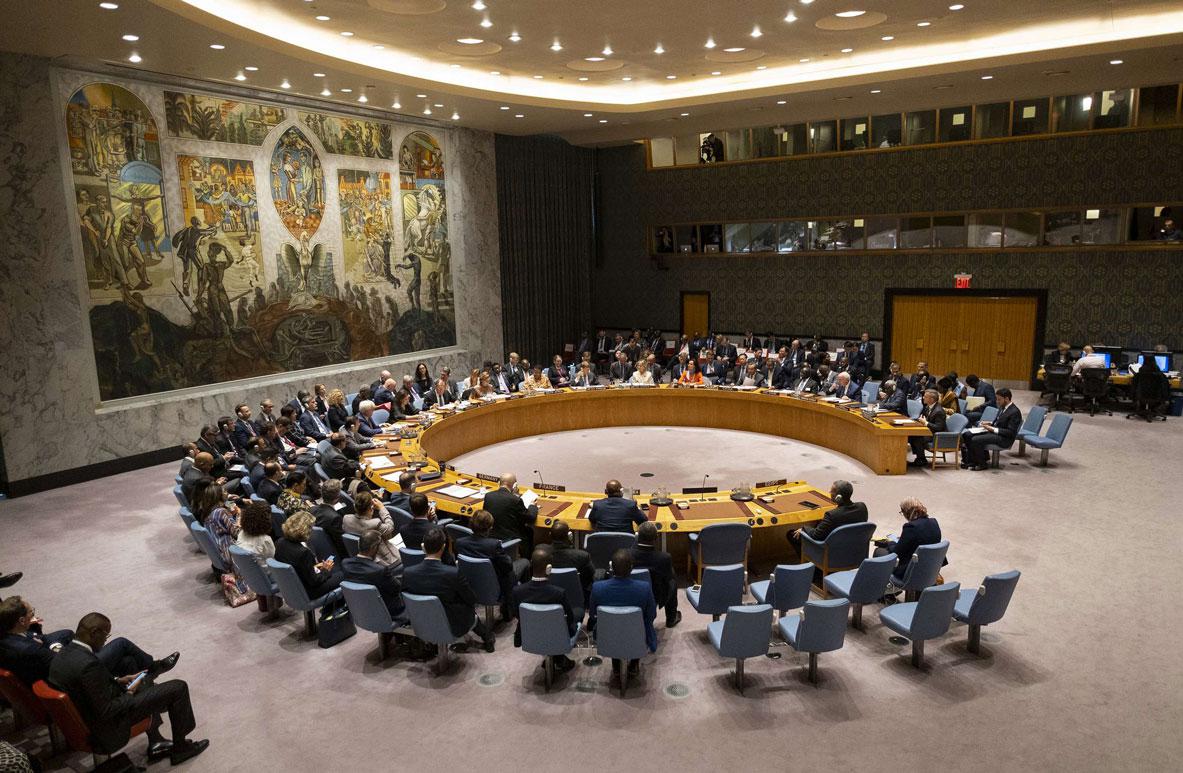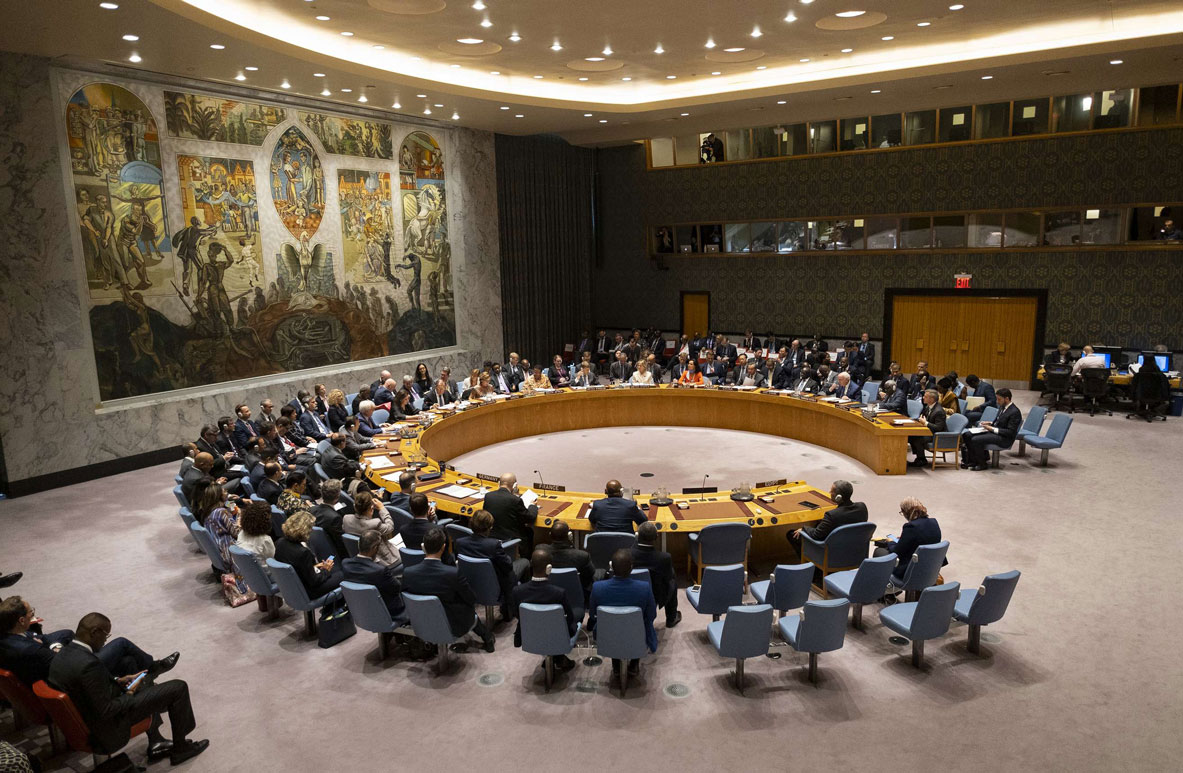Sanctions eyed after UN fails to condemn Turkish assault
LONDON - France said Friday that EU sanctions against Turkey over its offensive against Kurdish forces in Syria are "on the table", after European nations failed to convince the UN Security Council to condemn the operation.
"Obviously it's on the table," Europe minister Amelie de Montchalin told France Inter radio, saying potential reprisals over Turkey's incursion into northeast Syria would be debated during a European Council meeting next week.
"Our condemnation is strong but it's not just that... we're going to act," Montchalin said.
"You can imagine that we're not going to stay on our side of the table and say, 'Well you know, we recognise that things are complicated'," she said.
Turkey launched artillery and air strikes Wednesday against Kurdish People's Protection Units (YPG) militia after US President Donald Trump surprised Washington's allies in the fight against the Islamic State extremist group by pulling out US troops along the Syria-Turkey border.
Ankara considers the YPG, the backbone of the Syrian Democratic Forces which have led the fight against IS with US backing, a terrorist group waging a separatist fight on Turkish territory.
But the claims are not shared by many countries, who hail the key role played by the Kurds in dislodging the Islamic State group from Syria after years of fierce fighting.
They have set up their own institutions in the territory they control in Syria, where they have taken custody of thousands of Islamist insurgents, including many foreigners who came to fight.
Turkey announced Friday the first death of one of its soldiers in the operation in northern Syria, while dozens of Kurdish fighters and several civilians have been killed, according to the UK-based Syrian Observatory for Human Rights.
More refugee fears
At an emergency meeting Thursday, the five European members of the Security Council were unable to convince the rest of the 15-state body to adopt a statement telling Turkey to halt the military operations.
France, Germany, Britain, Belgium and Poland were forced to deliver their statement alone, while the United States issued a separate statement asserting that it did not endorse the Turkish operation.
European Union Council chief Donald Tusk, speaking to reporters after talks with the Cypriot president on Friday, said Turkey's security concerns should be dealt with through diplomatic and political means and that military action only exacerbates civilian suffering.
Tusk said Syrian Kurdish forces have been "crucial" in fighting the Islamic State terrorist group and abandoning them "is not only a bad idea" but raises many "questions both of a strategic and moral nature."
The UN Security Council session had followed a meeting of the EU’s Political and Security Committee on Wednesday in which EU states had difficulty in hammering out a common position on the Turkish offensive, reportedly due to opposition from Hungary.
Budapest said it did not want to upset its relations with Turkey at this time, but frustrated diplomats blamed resentment from Hungary over EU attempts to ensure the bloc takes common position on foreign policy issues. Budapest has also been one of the staunchest opponents of the settlement of refugees in EU states.
Turkish President Recep Tayyip Erdogan has defended Turkey's actions following worldwide condemnation of the offensive.
Claiming his critics "are not honest", he told Turkish lawmakers that he would open the door to Europe for 3.6 million Syrian refugees, currently in Turkey, if European countries label Turkey's military incursion in Syria as an occupation of the northern territory.
Tusk strongly criticised Erdogan's comments on Friday. He said Erdogan's remarks were "totally out of place," adding that the EU will never accept "that refugees are weaponized and used to blackmail us."
There are fears from EU states that the Turkish operation could lead to more refugees attempting to reach Greece through Turkey, amid warnings that the eastern Mediterranean route has once again become the main channel for asylum seekers trying to reach Europe.
Under the terms of an EU-Turkey agreement agreed in March 2016, Turkey has received most of a €6 billion EU package to help feed and house the 3.6 million Syrian refugees settled in Turkish camps, in order to stem the flow of refugees.
But that mechanism has never been seen to work properly, and EU-Turkey relations are strained over a host of other issues including Turkey's stalled EU accession talks and the presence of Turkish drill ships off the disputed island of Cyprus, for which the EU imposed sanctions on Ankara in July.
Erdogan has repeatedly used the presence of Syrian refugees in Turkey to threaten the EU with an unwanted influx of migrants.
Hotter and colder
The US, meanwhile, has sent many mixed signals after President Trump's announcement of the US troop withdrawal, but widespread opposition to what many have seen as a betrayal of the US' Kurdish allies could lead to US sanctions being imposed on Turkey over the assault in northern Syria.
While many interpreted that announcement by Trump as a 'green light' from the White House for Turkey to go ahead with its operation, Trump and top US officials have denied endorsing a Turkish invasion of northern Syria and have played down accusations that the US' Kurdish allies were "betrayed".
Secretary of State Mike Pompeo said Wednesday that Washington "didn't give Turkey the green light" to launch its offensive, but acknowledged that Turkey does have "a terrorist threat to their south, we've been working to make sure that we did what we could to prevent that terror threat from striking the people in Turkey."
Nevertheless, there has been massive bipartisan opposition to Trump's move, with one official even describing how the "spineless" US President "got rolled" in a phone call with Erdogan, after which the decision to withdraw US troops from the region was made.
US Senator Lindsay Graham, a Republican lawmaker usually seen as a staunch defender of Trump, has co-authored a bill with Democratic US Senator Chris Van Hollen that would freeze the US assets of Erdogan as well as Turkey's top defense, treasury, and energy officials.
The proposed legislation would also impose sanctions on any military transactions with Turkey, set sanctions on anyone who supports Turkey’s domestic energy industry for use by its armed forces, prohibit the sale of US defense articles to the Turkish armed forces and define Turkey’s purchase of Russia’s S-400 missile defense system - which has been a key source of strife between the two NATO allies - as “significant” and subject to sanctions.
Set to be introduced next week when the US Congress returns from recess, the legislation could possibly be passed over a veto from the White House. Senate Majority Leader Mitch McConnell has warned that enough lawmakers in Congress support a continued US presence in northern Syria that any legislation passed on the matter would likely be immune to an executive veto.



